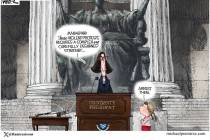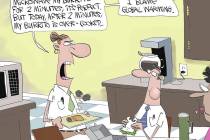Thieves in the temple
SALT LAKE CITY
On a warm summer afternoon, passersby in Temple Square speak many languages as they make their pilgrimage to the heart of the conservative religion that numbers nearly 14 million members worldwide. The nearby Salt Lake Tabernacle, home to the internationally renowned Mormon Tabernacle Choir, attracts the devout as well as the curious.
Seated on a bench in the shadow of majestic granite spires of the Temple of the Church of Jesus Christ of Latter-day Saints, Cameron Saxey makes a confession.
After 20 years as an FBI special agent, 14 of those spent chasing white-collar criminals, Saxey is particularly challenged by the insidious nature of affinity fraud that plagues his own church and has caused its hierarchy deep concern.
"I would much prefer investigating people in Los Angeles that are not of my faith," says the 42-year-old Saxey, who bears a resemblance to the late actor Christopher Reeve. "It breaks my heart to see the wives and kids of the men and women who are involved in fraud who are going to be going to jail."
But he does his job. And there's plenty of work to do.
In Utah, fraudsters exploiting a connection to the LDS church and its close-knit families have separated an estimated $1.4 billion from victims in recent years, according to the state's multi-jurisdictional Securities Fraud Task Force, which currently is working more than 100 cases. Despite their high dollar amounts, most of those investigations gain little media attention outside Utah, where FBI Supervisory Special Agent James Malpede notes that affinity fraud is second only to domestic terrorism on the Bureau's list of priorities.
Whether they fly under the false colors of foreign currency, prime bank, commodities, or real estate investments, nearly all the frauds are variations on the traditional Ponzi scheme, in which investors are promised above-market rates of return and below-market risk. In a Ponzi, a percentage of the incoming cash is paid as a "dividend" to investors to give the appearance of legitimacy and to encourage confidence and further investment.
Ponzi schemes depend on marketing. Whether through word-of-mouth or elaborate websites and e-mail come-ons, the scheme must have a constant infusion of cash in order to work.
Con artists have taken refuge in and enormous profits from groups of shared interest and trust, such as fraternal and religious organizations. Although so-called affinity crimes occur in all faiths, law enforcement sources agree con artists have been especially effective in exploiting trusting members of the Mormon faith in Utah, with its heavy focus on family connections, social-religious activities, and generations of community stability.
"Affinity fraud's really not a type of fraud," Utah Division of Securities Director Keith Woodwell says. "It's more a way to market your fraud. Think of it more in terms of friends and family fraud."
Adds Malpede, "Once they can get themselves into that community, they have kind of a built-in marketing network already. In many communities throughout the country, you can live in a place for five years and know two or three of your neighbors. That's not the case in Utah. Within six days of moving into our home in Utah County, we knew everybody in the ward because everybody had come over, had talked to us, and our kids had started playing together. So once someone with malevolent intentions gets into that community and starts gaining that trust and faith, they have a built-in group that they can access very easily. And most of these schemes are Ponzi schemes, so once they gain the trust of a few individuals, it's viral. They don't have to actually go out and market their product, because they've got people beating their doors down to get to them."
Many of the very things that make the church a comfort and spiritual salvation for so many people are the same characteristics scammers use to their advantage. For starters, a high degree of trust by church members.
"With affinity fraud, you ask how could people put their money in these investments?" Saxey says.
One way is to have an appearance of ecclesiastical blessing. Potential investors' suspicions are eased to the point they "put common sense in their back pockets, and just throw money," he says.
People want to believe they can make 30 to 40 percent profit without risk, Saxey says, and in Utah "no matter how outrageous the investment or the claims, if you have somebody that's a church leader that's involved, or just attend a seminar and make comments, they legitimize it."
While affinity fraud happens inside many religious, it has crossed generational lines inside the LDS faith. Not many years ago, the typical victim was an elderly member persuaded into draining his 401(k) or personal retirement account. More recent victims tend to be younger, but with a willingness to believe committing mortgage fraud in order to get in on a high-interest investment isn't so much a violation of federal and state law but a way of having the ends justify the means.
After spending a majority of his 25 years in law enforcement working white-collar cases, Utah County Attorney Investigation Division Bureau Chief Jeff Robinson knows all the twists, trends and affinity fraud cycles. He's seen a sad parade of church-going families destroyed.
"I think that everybody wants to be successful," Robinson says. "They tend to blur those lines of what's appropriate and what isn't appropriate. And because they want to be successful, they tend to ignore all the red flags.
"Secondly, we have a built-in structure that allows for this to go on. Whether it's the church, whether it's families, there's a structure. It really does make it that much easier to do it here. ... Here, everybody's friendly. They really want to give you the benefit of the doubt first. And I think that's a real problem."
Of course, he's not advocating his fellow church members become distrustful and cynical, only more careful. Anyone who carries his religion in one hand and an investment pitch in the other should generate suspicion, not confidence, he says.
"It's easy to get taken by your brothers and sisters whether you're Catholic, Presbyterian or Methodist, because you want to trust," Robinson says. "They get the pastor to get involved. Because if you get your pastor or your bishop or the president of the stake to get involved, you'll gain people's trust."
While there have been incidents of knowing participation by bishops and stake presidents, trusted church elders are often used unwittingly as shills by con artists.
"Sometimes they know, sometimes they don't," Saxey says. "Sometimes they're convinced that it's just a minor violation that they're committing. Many times their credibility is used and they're left holding the bag, also."
Fraudsters commonly start veiled sales meetings with prayers, sometimes spending as much as 90 percent of a pitch discussing Scripture before turning to the business at hand: separating squares from their savings by promising them, for instance, up to 10 percent monthly returns on their "risk-free" investments. In one case, a law enforcement source reports watching a rain of tears flow from one fraudster's eyes as he described the profits investors might put to good use in their lives and their religion.
One victim gave her perspective after a con artist charmed her into refinancing her condominium and handing over the equity.
"He was a religious man, so he says, and he really put on the, 'I am just so guided by the spirit and I know I'm here to help you,' " the woman recalled during the filming of an FBI-produced video on affinity fraud. "Just trust me. He just had the right words to say. I was single. I was a widow. He knew what to say to me to make me think everything was going to be great. So I did everything in my power to get the money and I gave it to him without even getting a contract signed."
If it's any solace to her, she's not alone. The task force has identified more than 4,400 fraud victims with more than $1 billion in losses.
In one case under indictment in U.S. District Court, Claud "Rick" Koerber is accused of operating a $100 million real estate investment Ponzi scheme through his Founders Capital and Franklin Squires Investments. Although under indictment for securities, mail and wire fraud, and money laundering crimes, he maintains a confident presence on the Internet and describes himself as a Libertarian, radio personality, "capitalist, a Mormon (Latter-day Saint), and a dedicated Dad."
"Just because the government accuses you, it doesn't mean it's true," Koerber told the Deseret News in January. "I'm proud of my business. I'm proud of what we did. I think that what we did was amazing."
The government accuses Koerber of using millions to fund a lavish lifestyle while deceiving investors with false profit reports.
Of course, not all investors are motivated strictly by greed. Some start out with grand plans to put the profit to good works.
"Obviously, greed is a component of it, but I've spoken to numerous people who say, 'I want to be a little more financially independent. I want to spend more time with my family because that's the most important thing to me and that's all I care about is spending time with my family,'" IRS Criminal Investigation Special Agent Ron Marker says. "So I think that is kind of a push for people here locally, they're looking for a way to get out of the rat race. Promises are made and deals are struck, and maybe they think that, well, maybe this is a way for me to focus on my family."
Whatever the relative good intentions, the result is calamity for families. Not only do they lose their investment, but often they are induced to commit mortgage fraud and tax evasion, Nevada-Utah IRS Special Agent in Charge Paul Camacho says.
"Rarely do they report the income," Camacho observes. "We do a very good job showing how they're enjoying the fruits of the money that they receive from these individuals. And we can put together a very righteous tax case."
Affinity fraud within the church has been so prevalent that in February 2008 the First Presidency of the Church of Jesus Christ of Latter-day Saints issued a letter on the subject to be read in Mormon congregations throughout the United States and Canada.
It read in part, "Reports of fraud schemes and unwise investments prompt us to again counsel members with respect to prudence in managing one's financial affairs.
"We are concerned that some Church members ignore the oft-repeated direction to prepare and live within a budget, avoid consumer debt, and to save against a time of need. Consideration should also be given to investing wisely with responsible and established financial institutions. We are also concerned that there are those who use relationships of trust to promote risky or even fraudulent investment and business schemes. ... We encourage leaders to regularly teach and reemphasize these principles."
The Utah Securities Fraud Task Force has offered a "Fraud College" seminar for the general public. The state's Department of Commerce and Division of Securities produced billboards and public service announcements warning of the fraudulent investment schemes.
In the end, affinity fraud's costs can't be quantified just in dollars and cents. The toll on families can be hard even for a veteran FBI agent to stomach.
"We have had a number of people who, once they realize they've lost their entire investment, have committed suicide," Malpede says. "That's not an uncommon event for us. It ruins families. It ruins relationships. People who've worked their whole life, have set up a reasonable retirement and own their own home have given up their entire retirement. They've leveraged their home. Now they're relying on Social Security as their only means of income."
Back in Temple Square, the devoted carry copies of the Book of Mormon and make their way through the afternoon shadows. The scene is idyllic.
FBI Special Agent Saxey is thinking of affinity fraud's many victims.
"Some individuals commit suicide," he says. "For elderly people, there isn't another lifetime to make the money back. They've lost their dignity."
He has often heard victims say, "'I heard him in church cry when he expressed his beliefs.'"
But they were the tears of a Temple thief.
John L. Smith (Smith@reviewjournal.com) is a Review-Journal columnist.























